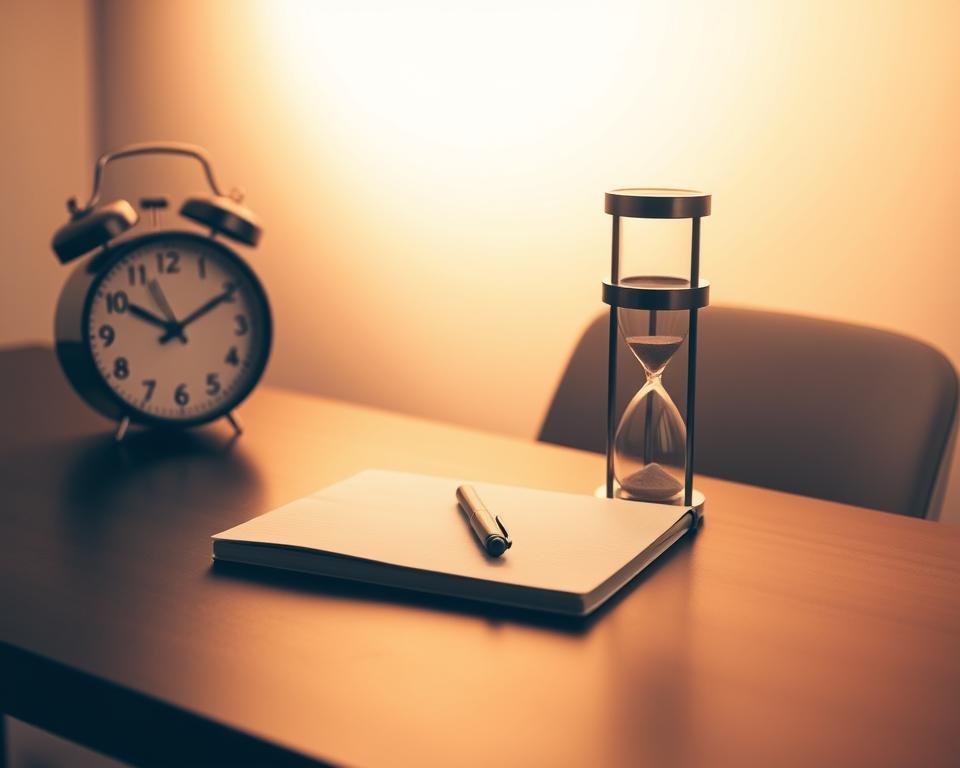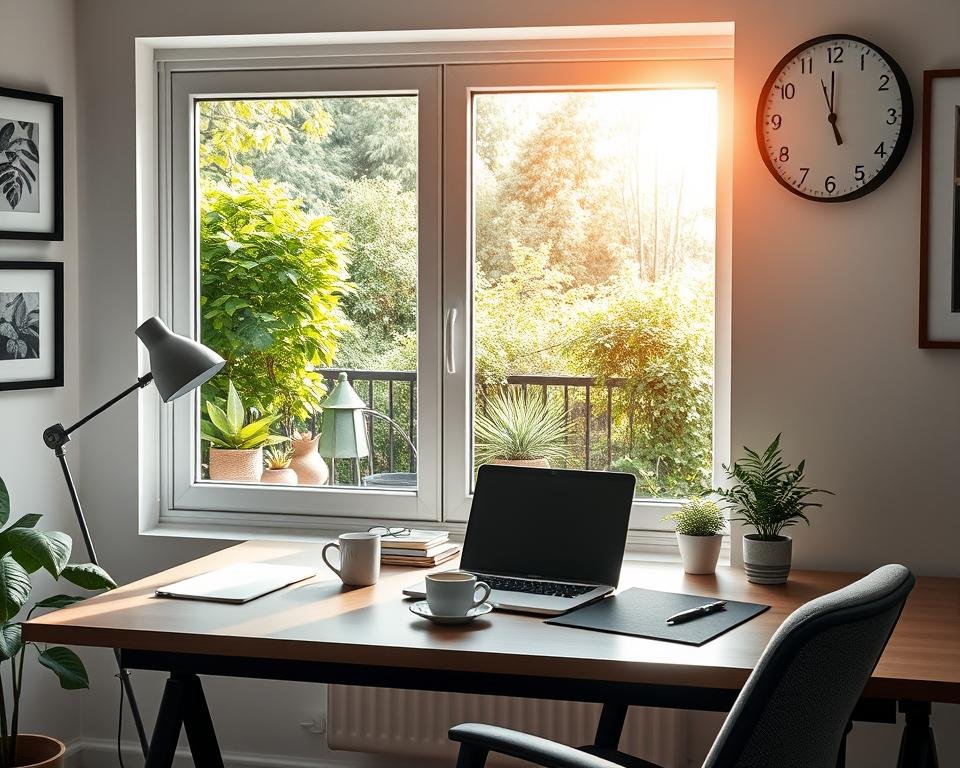In today’s fast world, keeping concentration is key to reaching our goals. Many distractions try to grab our attention. It’s easy to lose focus on what’s important.
I’ve been there too, struggling to stay focused. But, using the right focus techniques can really help. They can make us more productive and happy.
This article will show you how to improve your concentration. You’ll learn to stay focused on what’s most important.
Key Takeaways
- Simple techniques to enhance your daily concentration
- Strategies for minimizing distractions and staying on track
- The importance of mindfulness in improving focus
- Practical tips for boosting productivity
- Effective methods for maintaining attention in a distracting world
Understanding Focus and Its Importance
In today’s fast world, keeping focus is hard but key to reaching goals. As we tackle many tasks, knowing what focus is and why it matters is vital.
What is Focus?
Focus means being able to stay on a task without getting sidetracked. It’s about aiming all your effort towards a goal. This way, you can do better and get more done.
The Benefits of a Strong Focus
A strong focus brings many advantages, including:
- More productivity: You can finish tasks quicker.
- Clearer clarity: Focus helps you make better choices and avoid confusion.
- More mindfulness: Being focused makes you more aware of what’s around you.
- Success in reaching goals: Focus keeps you on track to meet your objectives.
The Impact of Distracted Living
But, not focusing can make life feel scattered, leading to less productivity and more stress. Without focus, you might:
- Feel tired from constantly switching tasks.
- Make more mistakes and do lower-quality work.
- Feel overwhelmed and frustrated.
Understanding focus and its role in daily life helps you improve your concentration. This way, you can reach your goals more easily.
Setting Clear Goals for Better Focus
Having clear goals is key to focusing better. Knowing what you want helps you stay focused. It keeps you away from distractions and keeps you on track.
It’s important to know the difference between short-term and long-term goals. Short-term goals are quick wins, like finishing a project in days or weeks. They help you feel accomplished and build momentum. Long-term goals are bigger, like saving for a house or starting a business. They need a lot of effort and time.
Short-term vs. Long-term Goals
Short-term goals help you reach long-term ones. For example, if you want to write a book, start by writing a few chapters. This way, you make progress toward your big goal.
It’s good to have both short-term and long-term goals. Short-term goals motivate you now. Long-term goals guide your efforts and give them meaning.

The SMART Goal Framework
The SMART goal framework helps you set good goals. SMART stands for Specific, Measurable, Achievable, Relevant, and Time-bound. It makes your goals clear and doable.
- Specific: Clearly define what you want to achieve.
- Measurable: Quantify your goal so you can track progress.
- Achievable: Ensure your goal is realistic and attainable.
- Relevant: Align your goal with your broader objectives.
- Time-bound: Set a specific deadline for achieving your goal.
Using the SMART framework makes goal-setting better. It helps you focus on what’s important.
Setting goals well is a great way to improve focus and productivity. Knowing the difference between short-term and long-term goals and using the SMART framework helps you plan better. This way, you can reach your goals more easily.
Creating an Ideal Work Environment
To improve your focus, make your workspace comfy and free from distractions. A good work area is not just pretty. It’s about making a space that helps you work better and stay clear.
Decluttering Your Space
A messy desk makes it hard to focus. Decluttering is key to a great work area. Here’s how to start:
- Get rid of things you don’t need on your desk or around it.
- Put your files and papers in order.
- Use drawers and shelves to keep things neat.
The Role of Lighting and Color
Lighting and color affect your mood and how well you work. Natural light is best, so place your desk near a window if you can. If not, get good lighting that doesn’t glare on your screen.
The colors around you also matter. Blue tones boost productivity, and green can ease eye strain.
Incorporating Comfort Items
Adding comfort items to your desk makes it more welcoming. It helps you stay focused. Think about:
- A comfy chair that supports your back.
- Plants to clean the air and lift your mood.
- Personal items like family photos or quotes that inspire you.
By making your desk comfy and personal, you’ll work better and stay focused longer.
Time Management Strategies
To stay focused, it’s key to learn different time management strategies. Good time management lets us focus on what’s important, avoid distractions, and work better.
The Pomodoro Technique
The Pomodoro Technique is a well-known method. It involves working in 25-minute focused periods, then taking a 5-minute break. This keeps work steady and prevents burnout.
- Choose a task to work on.
- Set a timer for 25 minutes.
- Work on the task without any interruptions until the timer goes off.
- Take a 5-minute break.
- Repeat the cycle for a total of 4-6 “Pomodoros” per session.
After four cycles, take a 15-30 minute break. This boosts productivity by giving regular breaks and keeping focus sharp.
Time Blocking for Enhanced Focus
Time blocking is a strategy that schedules tasks into fixed times. It helps in prioritization by setting times for tasks based on their importance and urgency.
- Identify the tasks that need to be accomplished.
- Schedule these tasks into your calendar, allocating specific time slots.
- Commit to the scheduled tasks, avoiding multitasking and minimizing distractions.
Dedicating specific times to tasks improves focus and ensures important tasks are done well.
Prioritizing Tasks Effectively
Prioritizing tasks is vital in time management. It means doing the most important and urgent tasks first. The Eisenhower Matrix helps by sorting tasks into four groups based on urgency and importance.

By focusing on urgent and important tasks, you manage time well and boost productivity.
In conclusion, learning time management strategies like the Pomodoro Technique, time blocking, and task prioritization helps stay focused and reach goals. These methods make daily routines better, reduce stress, and increase productivity.
Mindfulness and Focus
In a world full of distractions, mindfulness is a powerful tool. It helps people manage their attention better. This way, they can reach their goals more effectively.
Mindfulness is more than a practice; it’s a way of life. It makes you stay present and focused. The benefits of mindfulness are many, including less stress and better concentration.
Practicing Mindfulness Meditation
Mindfulness meditation is key for improving focus. It involves sitting quietly, focusing on your breath, and watching your thoughts without judgment. Regular practice can greatly improve your attention and clarity.
To start, try short sessions of 5-10 minutes. As you get more comfortable, you can increase the time.
Breathing Exercises for Clarity
Breathing exercises also help improve focus and clarity. Deep, controlled breathing calms the mind and reduces distractions. This makes it easier to focus on tasks.
Try breathing in deeply through your nose, holding it for a few seconds, and then exhaling slowly through your mouth. Doing this a few times can help you stay focused.
The Role of Gratitude in Focus
Practicing gratitude also helps improve focus. Thinking about what you’re thankful for shifts your attention away from distractions. It helps you stay positive and focused.
Every day, write down three things you’re grateful for. This simple act can keep you grounded and focused on your goals.

Using Technology to Improve Focus
Technology can help us focus better if used right. The right tools and apps can boost our productivity. They help us stay on track with our goals.
Productivity Apps to Consider
Many apps help us stay focused. Trello and Asana are great for organizing tasks. Evernote and OneNote are good for notes and info.
These apps make our work flow better. Trello lets us see our tasks clearly. This helps us track our progress.

Using Website Blockers
Website blockers are also helpful. Apps like Freedom block distracting sites. This helps us avoid procrastination and stay focused.
We can set these tools to block sites at certain times. This helps us avoid mindless browsing.
The Importance of Noise-Canceling Headphones
Noise-canceling headphones are key for many. They block out noise, making it easier to work. This is great in loud places.
Brands like Bose and Sony make top-notch headphones. A good pair can make us more productive. It also makes listening better.
Establishing a Routine
A good routine can really help you focus better. It makes your day more organized and predictable. This is key for keeping your mind sharp over time.
Morning Routines for a Focused Day
Starting your day right can make a big difference. Try activities like meditation, journaling, or a quick workout. For example, start with 10 minutes of meditation, then 30 minutes of exercise, and finish with a healthy breakfast.
Some good morning activities are:
- Stretching or yoga to get your blood flowing
- Drinking a glass of water to rehydrate after a night’s sleep
- Planning out your day to prioritize tasks

Evening Routines to Unwind
An evening routine is just as important. It tells your brain it’s time to relax. Try reading, taking a warm bath, or gentle stretches. Also, avoid screens before bed to sleep better.
Some good evening activities are:
- Dimming the lights to signal the body that it’s time to sleep
- Listening to calming music or nature sounds
- Writing in a journal to clear your mind
Weekly Reviews for Sustained Focus
Weekly reviews are also key. They let you check your progress and plan for the next week. It’s a time to see what’s working and what’s not.
| Activity | Frequency | Benefits |
|---|---|---|
| Morning Meditation | Daily | Improves mental clarity and sets a positive tone for the day |
| Weekly Review | Weekly | Helps in assessing progress and adjusting plans |
| Evening Reading | Daily | Aids in unwinding and preparing for sleep |
Adding these routines to your life can make you more focused and productive. The most important thing is to be consistent and mindful of how you spend your time.
The Power of Breaks
Breaks are more than just a pause. They keep our minds and bodies strong. In today’s fast world, breaks are key to staying focused and productive.
Understanding the Science of Breaks
Our brains can focus for 90-120 minutes before needing a break. This is called the Ultradian Rhythm. Breaks help us recharge, making us more focused and efficient.
Short breaks can make us more productive and creative. For example, a study showed that regular breaks lead to better work quality.
Fun Activities to Refresh Your Mind
Doing fun things during breaks can refresh your mind. Here are some ideas:
- Take a short walk outside for fresh air.
- Read a chapter from a book.
- Do a quick workout or stretch.
- Listen to your favorite music or podcast.
- Meditate or practice deep breathing.
These activities help you focus on something other than work and reduce stress.

When to Take Breaks for Maximum Impact
Timing is key for breaks. Here are some tips:
- Break after finishing a task or reaching a goal.
- Try the Pomodoro Technique: Work for 25 minutes, then break for 5.
- Take a longer break every few hours to rest.
- Listen to your body: Break if you’re tired or hungry.
By adding breaks to your workday, you can stay focused and productive.
In summary, breaks are essential for a productive day. By understanding their science, doing fun activities, and timing them right, you can boost your focus and work efficiency.
Nutrition and Focus
What we eat affects our brain’s work and focus. Eating the right foods can help us stay sharp. But, the wrong foods can make it hard to concentrate.
Foods That Boost Brain Power
Some foods make our brains work better. These include:
- Nuts and Seeds: Full of healthy fats and antioxidants.
- Fatty Fish: Rich in omega-3s, good for the brain.
- Leafy Greens: Full of vitamins and minerals for the brain.
- Whole Grains: Give us energy and fiber.

The Role of Hydration in Focus
Drinking enough water is key for focus. Even a little dehydration can hurt our thinking.
| Hydration Level | Cognitive Performance |
|---|---|
| Well-hydrated | Best focus and concentration |
| Mildly dehydrated | Focus and productivity drop |
| Severely dehydrated | Big trouble with thinking |
Caffeine: Friend or Foe?
Caffeine can help or hurt focus, depending on how much we drink.
A little caffeine can wake us up and help us focus. But too much can make us shaky and unfocused.
Social Connections and Focus
It’s important to know how social connections affect our focus today. The people we meet and how we interact with them can change how well we concentrate. This is true for our daily tasks and duties.
Relationships and Concentration
The company we keep can either help or hurt our focus. Positive relationships offer emotional support and reduce stress. They make it easier to concentrate. But, bad or too demanding relationships can distract us and lower our productivity.
- Good relationships boost our motivation and help us stay focused on our goals.
- Bad interactions can make us tired mentally and hurt our concentration.
The Benefits of Collaborative Work
Working together can greatly improve our focus. Collaboration can spark creativity and solve problems. Here are some advantages:
- Different views can lead to better solutions.
- Sharing work can lessen stress and help us focus better.
- Tools for teamwork can make us more productive.
Setting Boundaries with Social Media
Social media is big in our lives today. It helps us stay in touch but can also distract us. To stay focused, we need to set limits:
- Only check social media at certain times.
- Use tools to block distracting websites.
- Choose real-life talks for deeper connections.
By understanding how our social connections affect our focus, we can do better at work and in life. Setting boundaries helps us stay productive and balanced.
Overcoming Common Distractions
Distractions are a big part of our lives. But, we can beat them and stay focused. In today’s world, staying productive is hard. It’s key to know and fight distractions to reach our goals.
Identifying Personal Distractions
The first step is to know what distracts us. For many, it’s social media, emails, and coworkers who talk too much. I keep a log to see when and why I get distracted. This helps me know my own distractions.
To find your distractions, try this:
- Keep a log for a day or two.
- Write down when and why you get distracted.
- Look for patterns in your log.
Strategies for Avoiding Digital Interruptions
Digital distractions are a big problem. Alerts from our devices can mess up our focus. I use a few ways to cut down on these distractions.
Here are some good strategies:
| Strategy | Description | Benefit |
|---|---|---|
| Turning off notifications | Turn off alerts for apps you don’t need. | Less digital distractions |
| Using website blockers | Tools like Freedom or Cold Turkey block bad websites. | More focus on work |
| Scheduling email checks | Check emails at set times, not all the time. | Manage your time better |
Dealing with Procrastination
Procrastination is a big distraction. I fight it by breaking tasks into smaller parts.
To beat procrastination, try these:
- Split big tasks into smaller ones.
- Set deadlines for each part.
- Use the Pomodoro Technique to stay focused.
By knowing and fighting our distractions, we can improve our focus and productivity. Using these strategies has really helped me stay on track and meet my goals.
Continuous Improvement and Adaptation
Maintaining focus is a never-ending journey. It needs constant improvement and change. As you try different focus methods, always check if they work. Then, make changes if needed.
Assessing Your Progress
Thinking about your focus methods helps you see what’s best. By looking at your progress, you can improve your focus. This way, you make choices based on facts.
Adapting to Change
Changing your ways is key to keeping focus. When your goals or needs change, so might your focus methods. You might need to try new tools or change your daily routine.
By always looking to grow and adapt, you can keep improving your focus. Celebrate every small win to stay motivated and focused.
FAQ
How can I improve my focus and concentration?
To get better at focusing, try setting clear goals. Make your work area perfect for work. Also, practice mindfulness. These steps can help you stay focused and productive.
What is the best way to prioritize tasks for maximum focus?
Use the Eisenhower Matrix to sort tasks. It separates tasks into urgent vs. important. Focus on the most critical ones first. This keeps you on track and saves time.
How can I minimize distractions and stay focused in a distracting environment?
Find out what distracts you, like social media. Use tools like website blockers to avoid it. Also, make your work space better for focus.
What role does mindfulness play in improving focus?
Mindfulness helps you stay present and focused. Try meditation, breathing exercises, and gratitude. They improve your clarity and focus.
How can I maintain focus over a long period?
Create a routine with breaks, exercise, and self-care. Set clear goals and use tools to stay on track. This helps you stay focused for a long time.
Can nutrition and diet impact my focus and productivity?
Yes, what you eat affects your focus and productivity. Eat foods that help your brain, drink water, and watch your caffeine. These habits improve your focus.
How can I balance social connections with the need to stay focused?
Set limits on social media and focus on work. Prioritize teamwork and build supportive relationships. This balance helps you stay focused and connected.
What are some effective time management strategies for improving focus?
Try the Pomodoro Technique, time blocking, and task prioritization. These methods help you stay focused and manage your time well.







